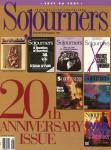Any remaining doubts about the conservative political goals of the current Southern Baptist Convention (SBC) leadership should have evaporated like dew on a hot summer morning after the June meeting of the SBC in Atlanta. With a giant stars-and-stripes backdrop on the speakers' stage, smaller flags fluttering through the crowd of 25,000, and speeches by George Bush and Oliver North, an outside observer might have mistaken the event for a convention by another name.
Despite repeated claims that their motivations for purging the convention of "liberals" over the past 12 years are purely religious (through forced resignations and firings), SBC leaders have shown no hesitancy to step outside their own lines when political ends are involved. As an example, consider that although fundamentalists unequivocally renounce speaking in tongues and ecumenism (among a myriad of other things), North, a charismatic, non-Southern Baptist, military man, was the speaker at the pastors' conference of this year's convention.
But for the first time since 1979, when the fundamentalists gained control of the convention, this year's meeting was marked by the virtual absence of controversy. Morris Chapman was re-elected president without contest. And although the vote was surprisingly close, SBC fundamentalists prevailed in completely defunding the Baptist Joint Committee on Public Affairs (BJCPA). The Washington, DC-based BJCPA, a highly respected champion of church-state separation, has refused to act as a lobbying agency for the conservative agenda of the new SBC leadership.
This year's lack of controversy was due primarily to the fact that Baptist non-fundamentalists, or "moderates," have largely decided to end their battle with SBC fundamentalists. Just a few weeks prior to this year's convention, 6,000 moderates met in Atlanta and formed the Cooperative Baptist Fellowship (CBF).
Though the newly formed CBF has a constitution and by-laws, officers, a steering committee, and a missions program, leaders are insisting it is not a new convention. The formal split many observers keep looking for will not likely occur anytime soon, if at all.
But the Fellowship, say its leaders, gives Southern Baptists an option not only about what they will support financially (such as the Baptist Joint Committee) but about what church-school literature they will use -- an alternative Baptist publishing company has already sprung up in Greenville, South Carolina. And they will have a wider range of choices about whom to call to serve as pastors.
Interestingly, though most Fellowship participants consider themselves theologically conservative, most have expressed support of women pastors. This is less a concession to feminism -- as their critics charge -- than a reflection of the traditional Baptist insistence on the right of every individual to interpret God's "call." Also, they say Jesus' treatment of women is the guiding principle.
THE DEFINITION OF WHAT makes one a true Southern Baptist, as put forth by SBC leaders of the past decade, has been so narrow as to force any diversity almost by default into the boundaries of the "moderate" camp. And for several years, moderates have been united primarily by their rage at being excluded from the larger group. Only recently are they trying to learn how to live together and how to define themselves proactively.
The displeased and displaced are many, and they have different gripes. Some are former stars who have lost their place in the Baptist constellation; others never did figure into the power structures to begin with. Some have longed for the good old days; others argue the old days were never all that good and see the current situation as an opportunity for a liberation of sorts.
But what the outcasts share -- besides higher tolerance for differences -- is a deep sense of identity with a Bible-centered (though not Bible-worshiping) tradition and a devotion to historic Baptist principles such as: church-state separation, the "priesthood of all believers" (as opposed to the "pastoral authority" doctrine so newly adopted by the SBC), the autonomy of the local congregation, the "competency of the individual soul" in matters of faith, and voluntary cooperation in missions.
Within the broad and loosely defined Fellowship are members of two groups that existed previously -- Baptists Committed to the SBC and the Southern Baptist Alliance. The former group (based in Texas) has been primarily engaged in organizing each year to get a moderate-conservative elected as president to the convention. They are likely to invoke the names of past SBC presidents -- men they say represented fairness and cooperation -- as their "cloud of witnesses."
On the other hand, the Alliance, which formed in 1987, is more likely to drop names such as Roger Williams and other "radical reformers" from a few centuries earlier -- people who staunchly resisted governmental attempts to marry and domesticate the church. Formed in North Carolina and now based in Washington, DC, the Alliance seeks to confront the pro-slavery origins of the SBC and heal the rift with other Baptist conventions, as well as to take a "servant" rather than a "crusade" approach to missions.
The SBC family feud has forced Baptists across the spectrum to clarify just exactly what it is they do believe; and in that regard at least, the fighting has not been without some good results. If in their newfound clarity of conviction members of the Fellowship can hold all the present diversity in healthy tension, they could have a profound impact on Baptist life, particularly in the South. But if its leaders keep dreaming of past "glory days" within the nation's largest Protestant body, or get bogged down with the "bigger is better" syndrome, the whole "Fellow-ship" may sink before it ever leaves the dock.
When this article appeared, Amy Greene was associate editor of SBC Today (soon to be renamed Baptists Today), the only national newspaper for Southern Baptists not controlled by the SBC.

Got something to say about what you're reading? We value your feedback!